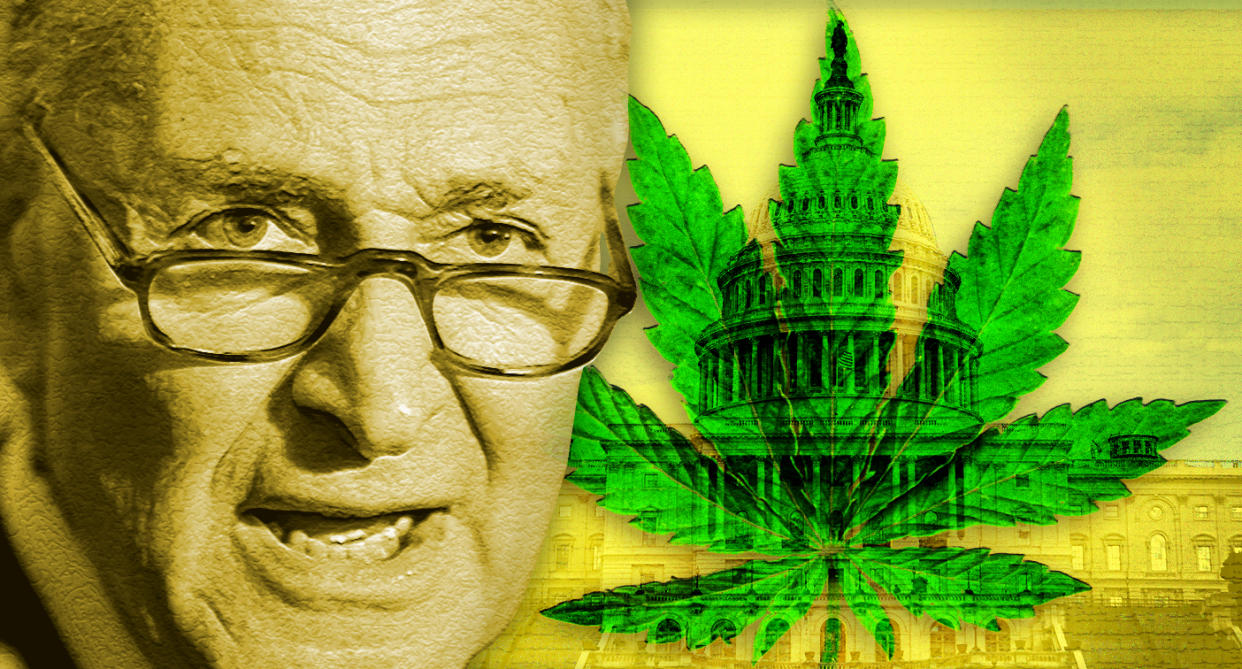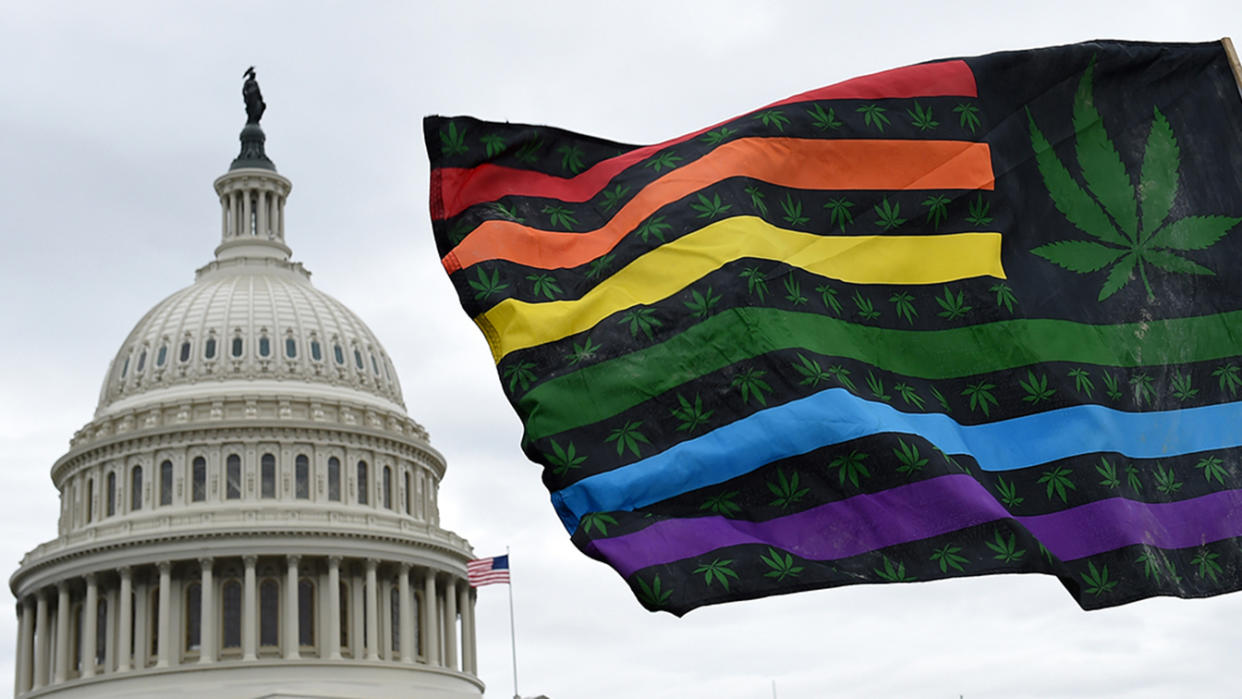Top Senate Democrats introduce new proposal to decriminalize marijuana
Top Senate Democrats are set to introduce a new bill that would decriminalize marijuana at the federal level, staking out a more aggressive position on reform than the White House.
Senate Majority Leader Chuck Schumer, Senate Finance Committee Chairman Ron Wyden and Sen. Cory Booker have proposed removing cannabis from the Controlled Substances Act, which would expunge the records of those with nonviolent offenses tied to weed, and set up a taxing structure.
“This is monumental because at long last we are taking steps in the Senate to right the wrongs of the failed war on drugs,” Schumer said during a Wednesday afternoon press conference. “The war on drugs has really been a war on people, particularly people of color. ... It’s not just an idea whose time has come, it’s long overdue.”
Schumer said he intends to show the White House the draft legislation and ask for its support.

With tens of millions of Americans now living in states where recreational marijuana is legal for adults, the contrast between federal and state laws is becoming increasingly stark, as some companies make millions on the drug while other Americans sit in prison for cannabis-related crimes. The bill would allow states to maintain restrictions on the drug if they wished.
“We legalized adult use in 2014,” Wyden told NBC News in an interview Wednesday morning, referring to his home state of Oregon, “and, oh my goodness, skeptics said that Western civilization was gonna pretty much end. What we have seen in terms of actual facts is we’ve seen more than six times the projected revenue.”
The bill’s path forward in the Senate is murky, as the legislative filibuster would require at least 10 Republicans to join Democrats in voting to pass it. When asked by NBC News if they had the votes, Schumer said they were working on it, and that marijuana reform was among their many top priorities. In December 2020, the House passed the Marijuana Opportunity Reinvestment and Expungement (MORE) Act — which contained elements similar to the new Senate proposal — but it was not taken up for a vote in the then Republican-controlled Senate.
The trio of senators met with marijuana legalization advocacy groups earlier this year, and a number of those groups told Yahoo News last week that they appreciated the legislators’ efforts on the issue.
“This is the first time in American history the majority leader of the United States Senate is leading the call to end prohibition of marijuana and joining him is the chairperson of arguably one of if not the most powerful committees in the United States Senate,” Booker said at the press conference with Schumer and Wyden. “This is a historic day that these two leaders are going to put their will and their work and all of their heart behind this justice bill.”

“It is time for legislators to comport federal law with the laws of the growing number of states that have legalized the plant, and it is time for lawmakers to facilitate a federal structure that allows for cannabis commerce so that responsible consumers can obtain high-quality, low-cost cannabis grown right here in America without fear of arrest and incarceration,” said Erik Altieri, executive director of the National Organization for the Reform of Marijuana Laws, in a statement supporting the legislation.
Sen. Chuck Grassley, R-Iowa, the ranking member on the Senate Judiciary Committee, issued a statement on the proposal Wednesday morning, saying, “This new bill puts the cart before the horse. It’s important that we have robust research and fully understand the good and the bad of marijuana use, especially in young people and over the long term.”
Polling shows that roughly two-thirds of Americans support marijuana legalization, including majorities in battleground states where it remains illegal for adult recreational use, such as Florida, Pennsylvania and Texas. Advocates for legalization also point to the racial disparity in arrests tied to cannabis, as outlined in a 2020 report from the American Civil Liberties Union.
“This is a grievous reality. Lives are being destroyed every single day,” Booker said Wednesday. “And the hypocrisy of this is that right here in the Capitol, now people running for Congress, people running for Senate, people running for president of the United States, readily admit that they have used marijuana, but we have children in this country, people all over this nation, our veterans, Black and brown people, low-income people, now bearing the stain of having a criminal conviction for doing things that half of the last four presidents have admitted to doing.”
The New Jersey senator, whose 2020 Democratic presidential primary campaign focused on criminal justice reform, clashed with with Joe Biden on the topic in a November 2019 debate.
“I have a lot of respect for the vice president,” Booker said of his then rival. “He has sworn me into my office, and he’s a hero. This week I hear him literally say that ‘I don’t think we should legalize marijuana.’ I thought you might have been high when you said it.”

Biden replied that he supported the decriminalization of the drug and expunging records but wanted more studies on the long-term effects of the drug before legalizing it. During his decades in the Senate, Biden was known as a proponent of the war on drugs and stiff penalties for offenders. Just before the debate exchange with Booker, he said more study was needed to see if marijuana was a “gateway” drug, while his top opponents in the Democratic presidential primaries were calling for full legalization. In subsequent interviews and events, Biden attempted to walk back the comments.
Since taking office, the Biden administration hasn’t been aggressive on cannabis policy. In March, the Daily Beast reported that the White House had punished dozens of young staffers for marijuana use. On April 20, press secretary Jen Psaki wouldn’t commit to the idea that Biden would sign a bill legalizing the drug, instead saying his position remained decriminalization and rescheduling on the Controlled Substance Act, a stance some reform advocates have called “impractical at best and disingenuous at worst.”
That same day, Schumer made a speech on the topic, saying, “Hopefully, the next time this unofficial holiday of 4/20 rolls around, our country will have made progress in addressing the massive overcriminalization of marijuana in a meaningful and comprehensive way.”
____
Read more from Yahoo News:


